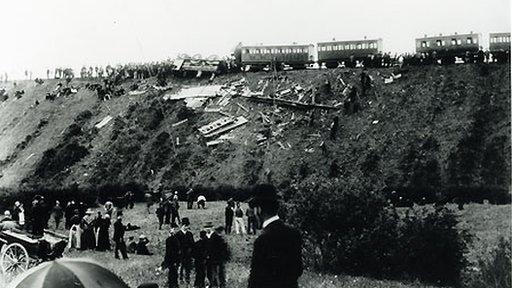Armagh train disaster remembered 125 years on
- Published

89 people died in the Armagh train diasaster 125 years ago
A century and a quarter after Ireland's worst ever railway accident, the embankment where it happened in Armagh is surprisingly unchanged.
There is no railway here now. But the embankment still stands, silent and brooding.
The vicious whin bushes that cling to its sides deter all but the hardiest climber from scrambling as far as the flat track bed which still runs along the top.
At its foot, a handful of cattle graze.
There is no monument, no plaque, nothing to mark the terrible events of 125 years ago, that claimed the lives of 89 people and left hundreds more injured.
12 June 1889 had begun as a day of joy and celebration in Armagh.
The Methodist church had arranged for a special train to take its sunday school outing to Warrenpoint.
This was a highlight of the year, not just for the Methodists, but for the hundreds of others who would join the special train.
Packed train
In the end, some 1,200 people - filled with anticipation and excitement - gathered around Abbey Street Church before following the band of the Royal Irish Fusiliers to the railway station.
The crowd was made up of people of all religions and classes, keen to take advantage of the rare chance of an affordable trip to the seaside.
When the train pulled away from the station at 10:15 BST, it was packed to bursting.
Even the luggage and guard's compartments held passengers, sitting among the picnic hampers and the band's instruments.
But around three miles out of the city, things began to go disastrously wrong.
The causes of the accident have been rehearsed many times.
Rev Denis Maguire said people have tried to forget about the disaster because it was "too painful"
Essentially, the engine was overtaken by the weight it was trying to pull up the slope out of Armagh. It stalled.
A decision was taken to de-couple the front carriages, move them to Hamiltonsbawn and then to return for the remaining cars.
Devastating impact
Stones were placed behind the wheels of those cars, but it was a hopelessly inadequate measure.
The cars rolled backwards, crushed the stones and began to build up speed as they continued back down the slope.
By the time they collided with the scheduled Armagh train coming the other way, the runaway cars were doing between 40 and 45mph. The impact was devastating.
Surgeon-Major Lynn, one of the organisers of the Sunday School trip, would later compare the carnage to "the bitterest battlefield".
In all, 89 people were to die.
Last week, their names were, one-by-one, read aloud at a special inter-denominational service in the Methodist church.
Its current minister is the Rev Denis Maguire.
When I caught up with him, he was getting ready to attend the annual Methodist conference; this is where his 1889 predecessor, the Rev William McMullan, had been at the time of the disaster.
Rev McMullan had returned to find his own son, his Sunday school attendant and his family, and almost the entire choir dead.
"As a Methodist minister here with children of the same age, it makes you realise the awful tragedy and the heartache that there must have been in this city," said the Rev Maguire.
Somehow, the Rev McMullan had to find the strength to give pastoral care to his congregation as funeral after funeral took place.
On the Saturday following the crash, there were 35 funerals.
How the scene of the Armagh train disaster looks today
'Painful'
The News Letter recorded how these were particularly heart-breaking.
An article said it was painful, "when one hears the groans and sobs of not only women and children, but of strong men who have come to lay their nearest and dearest in their last resting place".
On Thursday, those "nearest and dearest" will be remembered with the unveiling of a new memorial on the city's Mall.
The absence of a memorial until now perhaps underlines how the city had struggled over generations to come to terms with what happened that day.
"I think it was, for many, many years, something that people just tried to forget because it was too painful," said the Rev Maguire.
"They had learned to cope with it by just keeping it hidden away and I think the time is right now for a memorial and for this event to be marked because it was the worst railway disaster in this part of the world at the time and it's still the worst railway disaster that happened in Ireland.
"So I think - after 125 years - it is right to remember those folk who were killed."